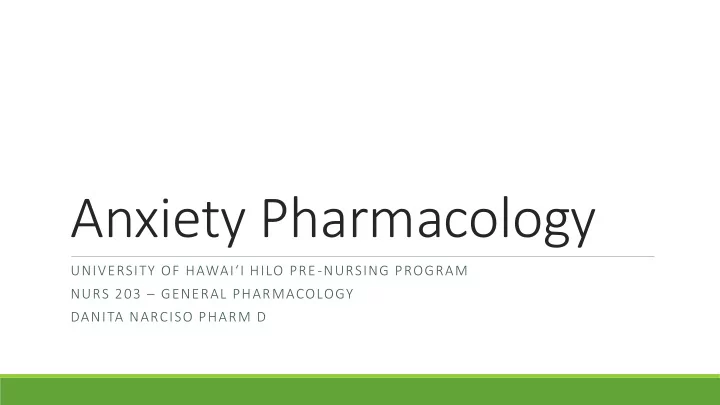

Anxiety Pharmacology UNIVERSITY OF HAWAI‘I HILO PRE -NURSING PROGRAM NURS 203 – GENERAL PHARMACOLOGY DANITA NARCISO PHARM D
Learning Objectives Understand the normal processing of fear vs fear processing in the anxious individual Know the classes of medications used to treat anxiety Know the agents within the individual classes that have properties outside the class in general
What is anxiety? A state or feeling of apprehension, uneasiness, agitation, uncertainty, and fear resulting from the anticipation of some threat or danger, usually of psychic origin, whose source is generally unknown or unrecognized. Mental Symptoms Physical Symptoms ◦ Fear ◦ Shortness of breath ◦ Difficulty concentrating ◦ Chest pain ◦ Worry ◦ Restlessness ◦ Irritability ◦ Nausea ◦ Sleep disturbances ◦ Trembling ◦ Etc. ◦ Etc.
Causes of Anxiety Drugs Medical conditions ◦ Pseudoephedrine ◦ Cardiovascular conditions ◦ SSRIs ◦ Angina ◦ Heart failure ◦ TCAs ◦ Arrhythmias ◦ Caffeine ◦ Gastrointestinal ◦ Ginseng ◦ IBS ◦ Ephedra ◦ Other inflammatory bowel conditions ◦ Cocaine ◦ Endocrine ◦ Levothyroxine ◦ Diabetes – hypoglycemia ◦ Prednisone ◦ Hyperthyroidism ◦ Cushing’s ◦ Albuterol ◦ Other ◦ Etc. ◦ Pain ◦ Migraine ◦ Asthma
Types of Anxiety Disorders Panic disorder Page 311 in the book ◦ Treatment alternatives Generalized anxiety disorder ◦ SSRIs Obsessive compulsive disorder ◦ SNRI ◦ TCAs Specific phobias ◦ Prazosin (PTSD) ◦ Antipsychotics Posttraumatic stress disorder
Under Normal Circumstances – creating/remembering fear Locus Coerruleus NE Amygdala: Consolidation of Fear HPA axis activity Cortisol
Under Normal Circumstances – fear extinction Rationalize Inhibitory signal from - GABAergic interneurons Fear Intercalated - - cells - - - Amygdala: Fear Extinction Central nucleus Fear Expression
Anxious Individuals Rationalize Inhibitory signal from - GABAergic interneurons Fear Intercalated - - cells - - - Amygdala: Fear Extinction Central nucleus Fear Expression
Benzodiazepines MOA - GABA channels work by allowing the Drugs in the class – flow of chloride into the neuron. This Short-Acting HYPERPOLARIZES the cell – making the neuron • Alprazolam less likely to fire (inhibitory). • Midazolam • Benzodiazepines increases the frequency of Oxazepam GABA channel opening as well as the affinity of GABA to its receptor. Intermediate-Acting • Lorazepam • Temazepam Lone-Acting • Chlordiazepoxide • Clonazepam • Diazepam
GABA & Benzodiazepine Receptors/Effects GABA – GABA channels work by allowing the flow of chloride into the neuron. This ◦ Main neurotransmitter of the CNS (located HYPERPOLARIZES the cell – making the neuron throughout) less likely to fire (inhibitory). ◦ GABA is an inhibitory NT ◦ Activation of GABA receptors Benzodiazepines increases the frequency of ◦ Anxiolytic GABA channel opening. ◦ Anti-spasmodic ◦ Hypnotic ◦ Amnesia ◦ Anesthesia ◦ ****NO PAIN RELIEF ◦ GABA receptor have a BZD binding site located on them
Benzodiazepines Uses ADRs ◦ Anxiolytic ◦ Sedation, depression, disorientation, respiratory depression, ataxia, retrograde amnesia, ◦ Antiemetic paradoxical excitation ◦ Sedative ◦ Anti-seizure ◦ Muscle relaxant ◦ Substance abuse (withdrawal)
Benzodiazepines - General Kinetics ADRs ◦ Vary with individual agents ◦ Sedation, depression, disorientation, respiratory depression, ataxia, retrograde amnesia, ◦ See following slides paradoxical excitation Notes Interactions ◦ Taper – rebound anxiety ◦ CNS depressants, alcohol, barbiturates, SSRIs, ◦ Withdrawal can precipitate seizures TCAs, antihistamine, anticonvulsants, opioids ◦ Watch for dependence and tolerance ◦ CYP3A4 inhibitors/inducers (except LOT) ◦ Should be used short term in anxiety or acute ◦ CYP1A2 – fluvoxamine (diazepam) treatment of panic attack ◦ Pregnancy ◦ Not considered safe ◦ Concentrated in breast milk
Benzodiazepines - Onset – rapid (<15 mins) Duration – 6-24 hrs. Metabolized – CYP3A4 – short lived metabolite Short-Acting Onset – rapid (<15 mins) • Alprazolam Duration – < 6 hours (anesthesia) Metabolized – Extensive CYP3A4 – active metabolite • Midazolam • Oxazepam Onset – Slow (30-60 mins) Duration – 6-24 hours Metabolized – Glucuronidation – NO CYP
Benzodiazepines - Onset – 15-30 mins Duration – 6-24 hours Metabolism – Glucuronidation (NO CYP) Intermediate-Acting • Lorazepam • Temazepam Onset – 30-60 mins Duration – 6-24 hours Metabolism – Glucuronidation (NO CYP)
Onset: 15-30 mins Duration: Long (>24 hours) Benzodiazepines - Metabolism: Metabolized by CYP3A4 into long lived active metabolites Onset: Slow (30-60 mins) Duration: Long (>24 hours) Long-Acting Metabolism: CYP3A4 into • Chlordiazepoxide an inactive metabolite • Clonazepam • Diazepam Onset: Rapid (<15 mins) Duration: Long (>24 hours) Metabolism: CYP3A4 & 2C19 into long lived active metabolites
Flumazenil – BZD Antidote MOA – Competes with BZDs at the GABA- ADRs benzodiazepine receptor (antagonist) ◦ Seizures ◦ HA, visual disturbances, pain at injection site, Reversal sweating, nausea, lightheadedness, arrhythmia ◦ Over-sedation ◦ Respiratory depression Kinetics ◦ Onset – 1-2minutes ◦ Peak – 6-10 minutes ◦ Duration – 1-3 hours ◦ Metabolized – Liver ◦ Excreted - Kidneys
Buspirone MOA – Unknown, high affinity for serotonin ADRs receptors 5-HT 1a&2 & moderate affinity for ◦ Dizziness, drowsiness, nervousness, HA, dopamine D 2 receptor confusion, excitement, nausea, diarrhea, weakness, blurred vision Kinetics Interactions ◦ Absorption – rapid ◦ Alcohol, other serotonergic/dopaminergic drugs, ◦ Onset – slow, days-weeks CYP3A4 inducer/inhibitors (grapefruit juice) ◦ Protein binding – 86% ◦ Pregnancy – category B ◦ Metabolism – CYP3A4, extensive 1 st pass effect ◦ Not known if secreted in breast milk ◦ Half life – 2-3 hours Notes ◦ Time to peak – 40-90 minutes ◦ Less sedating than BZD, less abuse, less ◦ Excretion – urine (29-63% as metabolites), 18- tolerance 38% in feces ◦ May be safer in alcoholic, elderly, and pregnancy
Beta Blockers - Propranolol Beta blockers (like propranolol) that are active in the CNS can inhibit fear consolidation. Locus Coerruleus NE Effects: Amygdala: • Decrease tremor in Consolidation of Fear skeletal muscles • Decrease heart rate • Decrease force of contractility HPA axis activity Cortisol
Questions
Recommend
More recommend